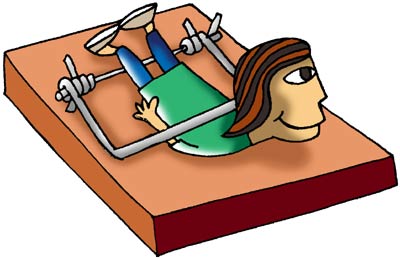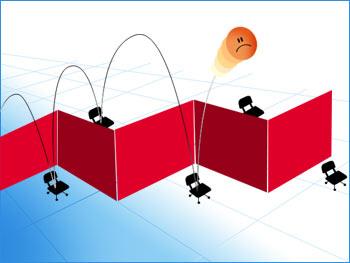Rajiv Vij
While reflecting on your professional life, the key issue you need to address is what you are really after -- is it a job, a career or your calling? Illustrations: Dominic Xavier
How do we choose our profession?
We decide based on whatever offers the best mix of career prospects, financial rewards, status, security and challenge in the overall context of our skills.
Why are so many people not that happy with their work then?
It's because we are either in a job that doesn't match our skills or we are pursuing it for the wrong reasons.
Lacking clarity about the core purpose of our professional life, we are usually swayed by what seems like a popular ladder to climb.
For example, with disregard to their real interest or aptitude, we have hordes of MBAs chasing investment banking or consulting jobs.
The author is Life and Executive Coach, and blogs at personalalchemyblog.org. He is former MD, Asia, Franklin Templeton Investments.
Click NEXT to continue reading
'Individuals are disappointed with slower career growth'
Looking out for quick success, individuals are then disappointed at any pace of career growth that's slower than expected.
Besides, attuned to constant comparison, we are quick to feel dissatisfied when our progress appears undermined by faster advancement of someone else.
Focused on financial rewards, we find the compensation always short of our faster growing aspirations.
Clearly, the quality of satisfaction with work suffers.
'People move organisations for higher salary'
While reflecting on your professional life, the key issue you need to address is what you are really after -- is it a job, a career or your calling?
People in a job are in employment because they really need the money to run their household.
While the socio-cultural aspects of the workplace can have a positive influence, the monthly pay cheque is of paramount importance to them.
They would perhaps be willing to consider moving to another organisation just for a higher salary.
People pursuing a career are driven more by the position, career growth, opportunity for recognition, and the prestige of their roles.
While they tend to have a longer-term perspective towards their work, they can easily get demotivated when their string of promotions begin to slow down.
Finally, there are a small percentage of people, who are engaged in what is their true calling.
They have a deeper connection with their profession, are inspired by their purpose, and then every day, work is like play for them. The people in the last group feel the most fulfilled!
'Each one's uniquely gifted and has a special purpose on earth'
I served as MD, Asia for a leading investment management firm.
I was well ensconced in my career till I first started to notice a sense of incompleteness about me.
There was a gnawing feeling of lack of fulfilment inside me. I was starting to question the merits of material progress and social recognition if I was no longer growing as a human being.
I wondered if there was an alternative option. Post significant soul-searching and driven by a deep desire to seek greater meaning, I gave up an exciting career to start a practice of life and executive coaching.
This was a life choice I made towards facilitating my personal journey of self-discovery as well as, through coaching, actively helping others with theirs.
It's been six years now and a liberating experience for me. I believe each one of us is uniquely gifted and has a special purpose on earth.
I have also come to appreciate that it is indeed possible for any of us to create the meaningful life that we sincerely want. So, go forth and follow your calling.





Comment
article